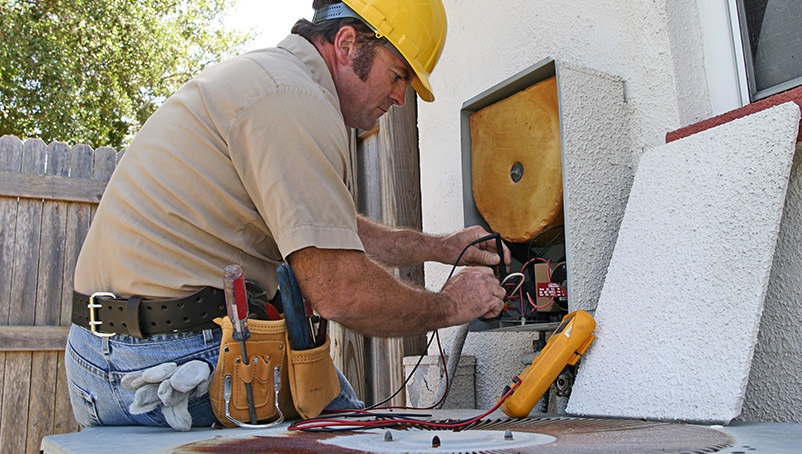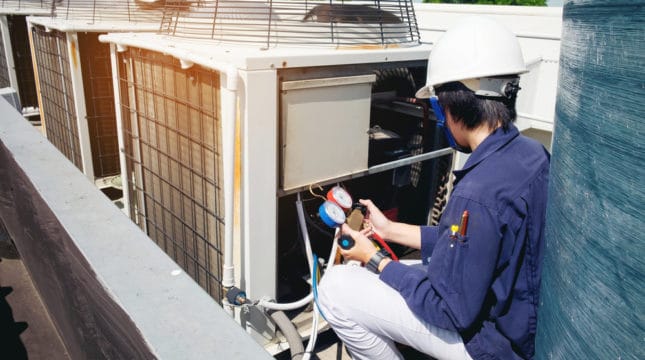Insurance for Florida HVAC licensed contractors
The DBPR requires that all license holders in the construction industry carry certain levels of business insurance in Florida. In addition, certain types of HVAC insurance may help to protect your business.
General liability insurance
All division two license holders, including specialists like certified and registered HVAC contractors, must carry $100,000 in liability insurance and $25,000 in property damage insurance.
These limits are significantly less than Florida general contractors, who must carry $300,000 in liability insurance and $50,000 in property damage coverage.
General liability insurance in Florida can help cover the costs of work-related accidents or property damage to third parties.
Workers’ compensation insurance
License holders must also carry workers’ compensation coverage if they have employees unless they get an exemption within 30 days of their license being issued. This insurance can help provide wage protection and other benefits if an employee gets injured on the job.
Tools and equipment insurance
Tools and equipment insurance can help cover the cost of replacements and repairs for damaged or stolen work gear.
Commercial auto insurance
Commercial auto insurance protects against costs related to accidents, such as property damage and medical expenses, if you drive for work.
Commercial property insurance
For buildings, inventory and equipment protection, you’ll need commercial property insurance. It covers your business in the event of damage to your property.
How long does it take to get a Florida HVAC license?
HVAC contractors should expect the licensing process to take approximately three months, not including the time required to meet any experience or education requirements.
An estimated timeline for the licensing process may look like this:
- Register, study for and take the appropriate license exam: 2 to 6 weeks.
- Gather proof of experience and other documentation requirements: 1 to 2 weeks.
- Get fingerprinted at an approved Livescan Service Provider: Within five days of the application.
- Submit an application for processing and assignment to a board review meeting: 2 to 4 weeks.
- Prepare for a board review meeting: 2 to 3 weeks.
- Upon approval, the license is issued: Within two weeks.
The total time for licensing will vary based on the kind of license you apply for, the number of applications the Board is currently processing and whether your documentation is complete at the time of application.
The licensing process is slowed considerably if the licensing board has to ask you for additional supporting documentation. To expedite the process, make sure you understand the application process and requirements before you begin.
The Florida HVAC license exam
Exams for Class A and Class B air conditioning contractor licenses consist of a business and finance test and a trade knowledge test. There are different trade knowledge tests for Class A vs. Class B licenses.
Applicants with a four-year accredited degree in construction or a trade-related degree approved by the licensing board are exempt from taking the trade knowledge test, according to the DBPR.
All applicants must take the business and finance portion of the test. If you’re taking the Class A air conditioning trade exam, expect 130 questions and 7.5 hours of testing time. The Class B HVAC trade exam has 80 questions and takes about 5 hours.
You’ll also pay a $135 exam registration fee, an $80 testing fee for the business and finance portion and an $80 testing fee for the applicable trade knowledge test.
Since the requirements for registered HVAC contractors vary by location, you may also have to pass a trade knowledge exam. The local licensing authorities set these requirements based on local building codes and other factors, so the specifics for exams will vary by jurisdiction.
How NEXT helps Florida HVAC licensed contractors
NEXT can help you quickly find the right insurance at an affordable price so you can get your HVAC contractor license and protect your business.
We’re 100% dedicated to self-employed workers and small businesses, which allows us to create customized insurance packages.
You can get a quote, explore options, purchase coverage and get your certificate of insurance in under 10 minutes with our seamless online option. It’s as simple as answering a few questions.
Start a free quote with NEXT.








